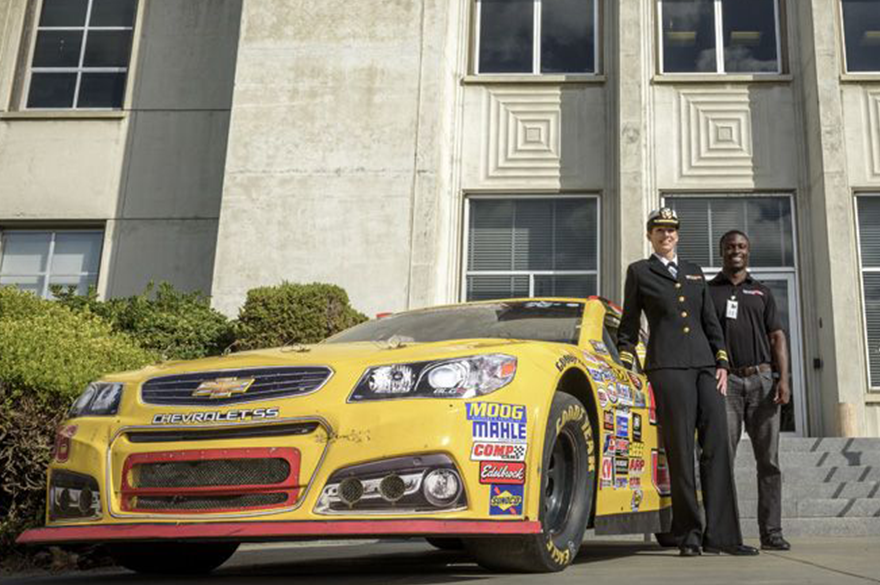
Captain Leedjia Svec, Ph.D.: From Seed Experiments to Shaping the Future of Science and Service

For Captain Leedjia Svec, Ph.D., the seed of a career in science was planted early—quite literally. One of her clearest childhood memories comes from kindergarten, when she and her classmates slipped seeds into dirt-filled plastic baggies, taped them to a window, and carefully measured the growth of roots over time based on how much water they were given.
“That’s the foundation of the scientific method and it left such a strong impression on me,” she recalls. “It was cause and effect, testing variables, and discovering how the world works.”
That fascination with discovery guided her through school, where she excelled in science fairs, clubs, and courses. Initially drawn to veterinary medicine, she realized her interests lay elsewhere.
“I loved the idea of research, studying and doing something useful with that knowledge by applying it for the betterment of humanity and society,” she said.
In college at the University of the Pacific, she found her footing in psychology—paired with a then-unusual engineering technology minor. The combination, once seen as mismatched, anticipated the now-thriving field of human systems integration.
By age nine, Svec already knew she wanted a Ph.D. She pursued a combined master’s and doctorate at the University of Nevada, Reno, where a serendipitous encounter at a research conference led her to the Navy’s Naval Research Enterprise Internship Program (NREIP). That internship immersed her in research on laser eye protection, a topic that became central to her dissertation as well as her second duty station.
She says her NREIP mentor, then Lieutenant Tyson Brunstetter (now a retired Captain), was pivotal to her research but also to understanding that some scientists wear uniforms. Commissioning as a U.S. Navy officer was not something Svec had envisioned before but the chance to combine research with service, equal pay across genders and opportunities to explore multiple fields made the decision an easy one.
“I had always pictured myself working in a government lab, but I never knew this path existed,” she said. “It allowed me to do science while serving a mission larger than myself.”
Throughout her career, Svec has distinguished herself not only in research but also in mentorship. At nearly every duty station—from NASA Ames to the Pentagon to Joint Base San Antonio—she launched or expanded STEM programs, particularly through the Naval Research and Engineering Apprenticeship Program (NREAP). More than 60 interns have come through her efforts, many of whom now hold leadership roles across government and science.
“My ‘kids,’ as I still call them even though they are grown, are what I’m most proud of, the impact that they made and how they're still serving the government in various roles and through the experiences that they got through me like the experiences that I got through others like Tyson,” she said.
Svec’s intellectual curiosity has also taken her beyond the lab. She pursued a master’s degree in international relations after recognizing the global dimensions of science during a research trip to Japan. On another trip to Nigeria through TechWomen, she discovered colorful West African fabrics and, ever the consummate researcher decided to analyze them, finding mathematical patterns in them. These later formed the basis for educational outreach and a space fashion show.
Today, as part of the Office of Naval Research, Svec describes her role as “funding the future.” She helps shape and support the scientists and their science that ensures warfighters can perform at their best. Though she no longer spends her days in the lab, she sees her work as enabling others’ breakthroughs.
“I’m a facilitator now,” she says. “I strive to pave the way for scientists who are doing critical work.”
Her advice for the next generation of researchers is both practical and encouraging: broaden your horizons, cultivate your emotional intelligence, and learn by doing.
“You don't always know where something's going to take you,” she said. “It's like a seed that you plant and it may take a year to germinate, may seem dormant, but then spring up. What blooms is not always evident immediately. So, I think just always working on yourself to be ready for when that which you never imagined arises is key. Then when opportunity knocks, you think that's it! That's what I want to do and go for it.”
From college psychology experiments to mentoring future leaders at NASA, Captain Leedjia Svec’s journey embodies both curiosity and service. A scientist at heart, a mentor by choice, and a leader in uniform, she continues to show how science can shape not just discoveries, but people and possibilities.